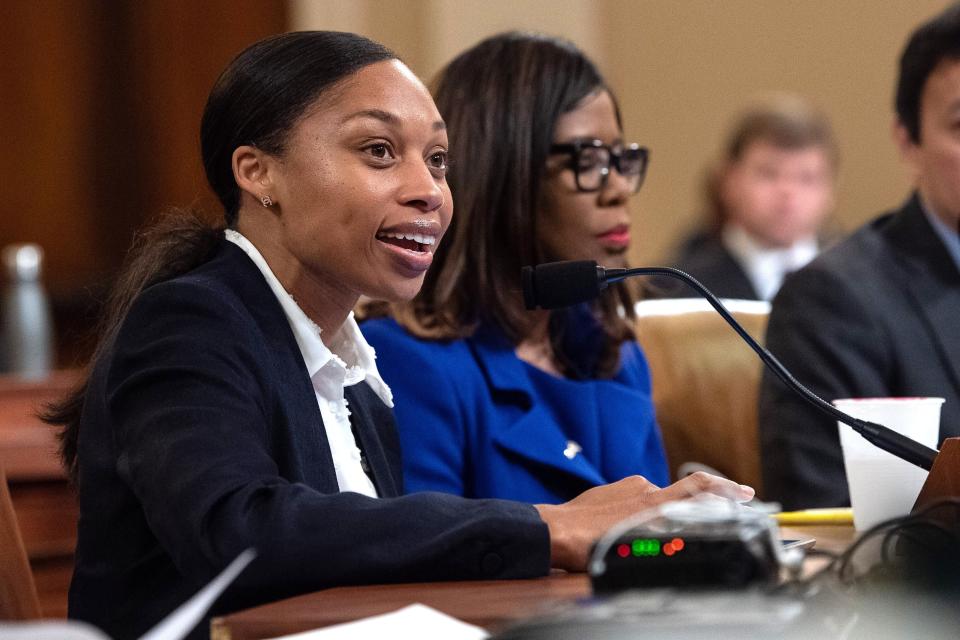'They faced death like me': Olympian Allyson Felix testifies on race in the maternal mortality crisis

Allyson Felix revealed in December she gave birth via emergency Caesarean section and as a result heard from others how common her experience was.
On Thursday the most decorated woman in US Olympics track and field history, who is eyeing her return, spoke further about the “two most terrifying days of my life” in front of the House Ways and Means Committee focused on racial disparities in maternal mortality.
“There were others like me,” she said, via The Washington Post, “just like me. Black like me, healthy like me, doing their best — just like me. They faced death like me, too.”
Felix has emergency c-section at 32 weeks
Felix, 33, described for espnW in December the life-threatening complications stemming from a 32-week check-up. The six-time Olympic gold medalist had high blood pressure and the baby’s heart race decelerated. She told the committee doctors told her both she and her baby were at risk.
She told the committee, via The Washington Post:
“Mothers don’t die from childbirth, right? Not in 2019, not professional athletes, not at one of the best hospitals in the country, and certainly not to women who have a birthing plan and a birthing suite lined up. I thought maternal health was solely about fitness, resources and care. If that was true, then why was this happening to me?”
Camryn was born 3 pounds, 7 ounces and 16 inches and spent a month in the NICU.
Up until the feature ran, the public had no clue Felix was pregnant. She said while she and her husband, Kenneth, were excited about starting a family she wasn’t sure how it would affect her career. She said she was worried about disappointing everyone who thought she should put running first.
Felix’ story ‘not so uncommon’
Felix learned after giving birth and sharing her story that what she went through isn’t uncommon. She said she wants to use her platform to raise awareness about the risks and dangers faced by African American women during pregnancy, childbirth and postpartum.
Felix was joined at the hearing by doctors, academics and medical experts who outlined the risk and dangers African American women proportionally face.
More than 700 women die each year from pregnancy complications — more than any other developed nation — and 3 in 5 of them are preventable, according to a report this week from the Centers for Disease Control and Prevention.
“I learned that my story was not so uncommon, there were others like me — just like me,” Felix said, via NBC Sports. “They faced death like me too, and as I started to talk to more of those women and hear about their experiences, I learned that black women are nearly four times more likely to die from childbirth than white mothers are in the United States and that we suffer severe complications twice as often.”
Women of color are at an even higher risk. Per the report, black mothers died at a rate 3.3 times higher than white mothers. They are more likely to suffer complications and are twice as likely to give birth prematurely. And they’re commonly not believed or undertreated when they tell doctors about their pain.
In 2017, NPR profiled the death of Shalon Irving three weeks after she gave birth. A financially well-off researcher who focused on eradicating disparities in health access, Irving became a symbol of maternal mortality as the conversation has grown into a crisis, as lawmakers repeated Thursday.
Felix told the committee, via The Washington Post:
“I was not aware that I was more at risk. I think that says a lot. It’s not really talked about ... but it is a real issue. I think had I been more aware, maybe I would’ve had better questions to ask. Maybe when I first saw my swollen feet, I would’ve rushed in.”
Serena Williams, one of the most recognizable and popular African-American athletes, had her own complications when she gave birth in 2017. She had to continuously urge her doctors to administer a CT scan and give her an IV, only because she knew from past experience she was experiencing blood clots.
Felix is preparing to make her return at Nationals and will bring Camryn with her to events. She’s hoping to make the 2020 Tokyo Olympics.
Her full testimony is available to read and to watch.
More from Yahoo Sports:


